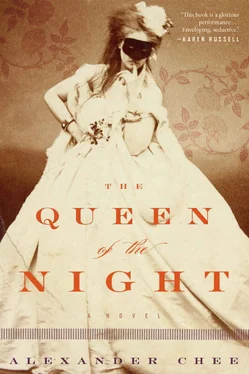I also missed the company of the girls late at night. The dorm now seemed like a paradise by comparison to the apartment, where I had only the maids he’d provided for company, Doro and Lucy. Doro was a slight Italian woman with a fierce, hard face softened, usually, by an expression of perpetual amusement in her eyes. She seemed of an indeterminate age, her thick dark hair graying slightly. Lucy was young, a plump French girl, pink and blond, who said so little I almost thought her slow, but she was not, or her wit was not, at least. She liked to wink before she burst into the bawdy laughter I soon knew to expect from her.
I was unused to maids and didn’t know how to let them do for me, and so I tried to befriend them instead, and at first they resisted. I sometimes heard them in the kitchen, or the rooms they shared off the kitchen, and tried to catch them, but if they heard me, I was met with silent, blank, expectant faces — faces waiting for requests or commands. Finally, I crept into the kitchen late one night to find them drinking gin and playing bezique. They stared at me as if at a mouse, and then as if at their lady, silent.
Please, I said finally.
They looked at me for another long moment, and then Doro, who it seemed was in charge, relented and gestured with her chin at the chair between them. I sat down as she dealt me in.
§
In the month of waiting for the letter from the Conservatoire, cards and gin were not enough, and so any night I found myself free, I went to the Mabille instead, even taking the risk of going alone when the tenor or his friends wouldn’t take me. I danced until morning, relishing the walk home, my hair wet, steam rising off me in the cold like smoke.
There I was a champion. The clap of my back on the hard wooden tables, my legs in the air, my skirt a wheel, and the cold air on my thighs while I was drunk from the screams in the room and the misery of my dance-floor rivals, whether those of an hour or a week or a year. All of us were trying to kick higher or fall faster, but I had learned to win with a one-legged kick I could hold, one hand in the air, one on my hip, my skirt around my waist as I swiveled my hips. If you did it wrong or hadn’t practiced, you’d fall over backward, very painful, so challengers had to know in order to get it right. A first challenge could undo you, but I could stand there and do at least four in a row.
I missed Euphrosyne even though I was too hurt still to write to her or otherwise invite her. She seemed to feel the same of me. But on the nights her gentlemen brought her, we were tentatively reunited, and soon we were joining our arms again as before, kicking and whirling as groups of men gathered to cheer us on.
Her efforts at forgiving me were aided by the tenor’s never being there. Mine were aided by our both knowing she was right; I had a future unlike hers. I could be more than this, and she could not.
I soon wore my cancan shoes as often as I could, for they were very sturdy, and if I wore them always, I could dance on any evening. I liked the clip-clop they made as I walked across a street, as if I were a mythological creature with hooves instead of feet.
It was better in this life if you weren’t altogether human, I would think, as I heard the sound. It was easier to bear.
§
Given the Conservatoire jury professor’s warning me not to use my voice, in lieu of rehearsals, the tenor took me to the opera much more than before.
He had not relinquished his role as my teacher. It is my greatest wish, he said, that you fall in love with one of the roles you see on the stage. Your talent will lack focus until then, he said. And so I went along, waiting to be moved.
No longer did I have to entertain his friends as before. The dresses that were delivered to the apartment were finer than ever. He dismissed Doro from dressing me, enjoying the task himself. He was like a boy with the corset, which he liked to pull shut almost as much as he liked to pull it open.
In his box at the opera, he regularly introduced me to his friends now as his protégée and spoke of how we were awaiting the results of my audition at the Conservatoire.
And her voice? these new friends all asked with a thrill I did not yet understand.
A Falcon, he would say, and they would draw back, startled. As if they were in the presence of something rare.
I typically said little during these occasions, only smiled and nodded, afraid of betraying to them the quality of my French. I still could not imagine being like the women I saw on the stage or the women in the other boxes, no matter how finely he dressed me, and these introductions made me nervous. The more I waited, the more I was sure the Conservatoire had given me the audition only due to the letters of support the tenor had provided — that I was never to be taken seriously — and that his friends must know this also. And so I was nervous in the company of these celebrities and distinguished personages, and drank too much, ate too little. When I became drunk, I used the pin from my brooch on my legs so as not to fall asleep, pricking myself under my garters until he took me home.
We never spoke of what would happen if I was rejected. We acted instead as if it were impossible. Each time he left me, however, I feared it. If I failed him, it seemed to me this game would quickly reach its end.
§
We must get you to see Delsarte, he said to me one evening, as we exited the opera. That the Conservatoire jury cannot reproach me for.
I did not think to ask why, but to Delsarte I went.
Delsarte was one of the most famous voice teachers in Paris, though if you called him such, he would disavow it. He taught what he called “singing false,” by which he meant accomplishing in the singer the appearance of emotions the singer did not actually feel, so as to move the audience. He taught this in his famous salon of portraits, the walls covered in paintings of the expressions of the different emotions.
Your face is a mask, he said. Do you know the masks of comedy and tragedy? I told him I did. Then think of your face as a perfect mask. A magical one. Able to assume the shapes at command, and he struck the portraits one by one with his pointer, counting them off. Anger, Terror, Laughter, Love, all of them yours to command!
Our first lesson consisted of my singing the Nabucco audition piece for him, and as I did so, he pointed to each of the portraits for the shape my face was to make at each part of the song. He was disappointed I could not accompany myself on the piano — a singer must be able to do so, he said, as the occasion demands — and grudgingly allowed the tenor to accompany me, who did so quite well, never once flinching as I did when Delsarte smacked each portrait.
I was anxious not to disappoint either of my teachers, but the fierce expectancy in Delsarte as I sang and he pointed to a portrait was comical to me, and I found myself moving between terror and hilarity no matter what my face did.
Stop, he said, as the tenor began at the piano once more. One moment. He came over to me and said, Close your eyes.
I did so.
He took his fingers and set them on my face. Anger, he said, and the image of his pointer at this particular portrait appeared in my mind. As my face tried to assume the expression, he pressed against it, pushing it into the shape. Grief, he said. And again pressed my face to order it. We did this for some time before he let the tenor play the piano again. The fingers of the old genius pushing my face into place.
Your face appears to be only a mask, he said to me, of his decision to teach this way. It does not appear to know the shapes. Instead, everything is in your eyes, but we cannot see your eyes from the audience. So I closed your eyes so that you would have to speak another way.
Читать дальше












